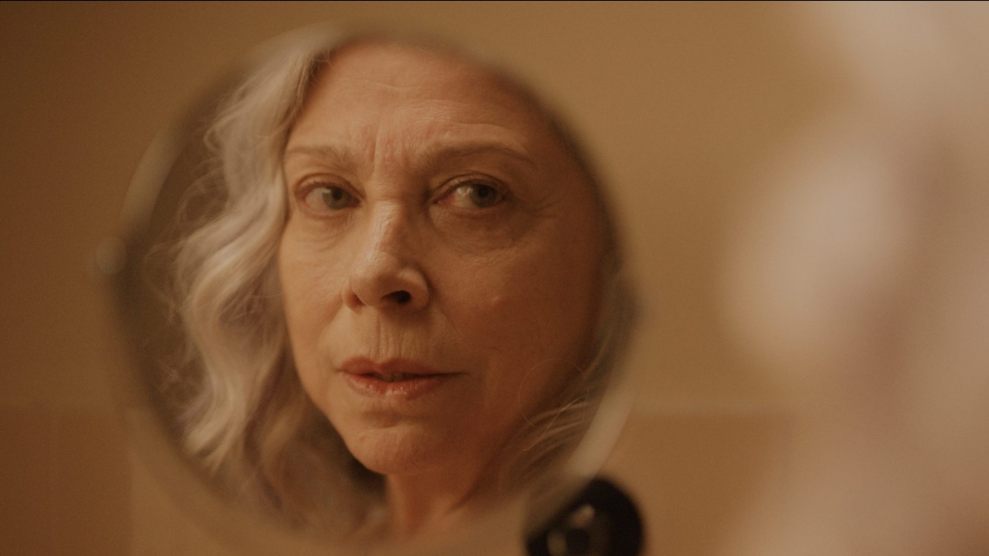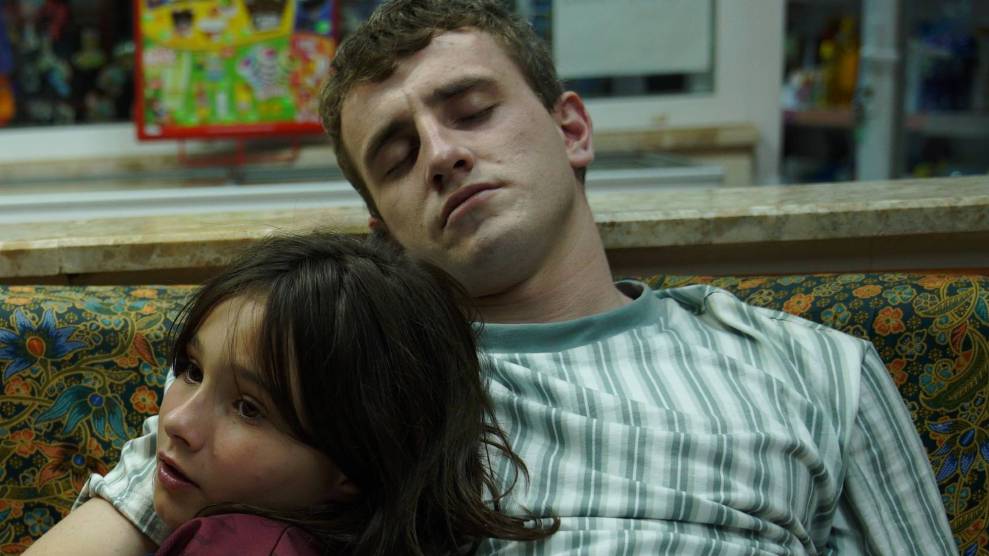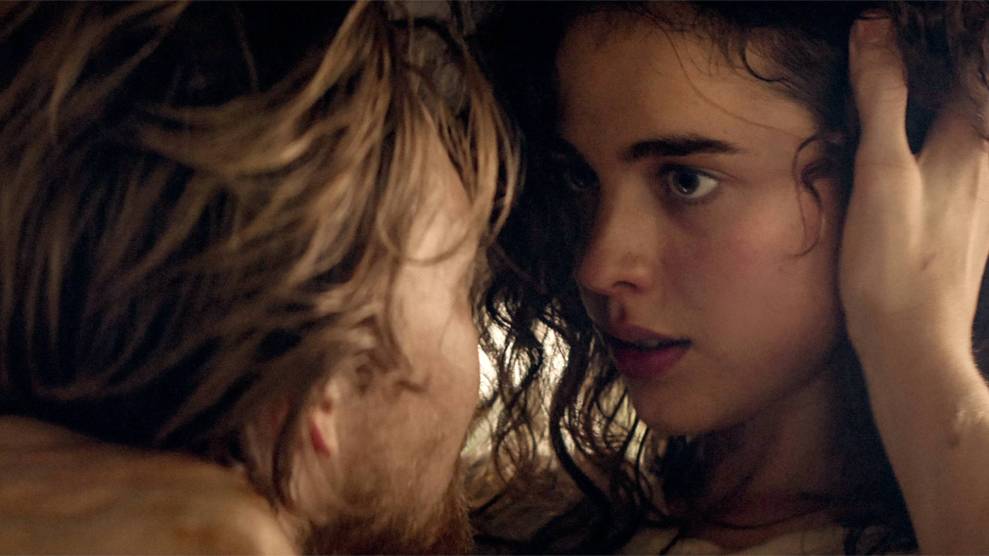
Fran Fernández-Pardo
Despite the paintings of shirtless saints and Jesus statues with abs, sex and Christianity are not known to mix. When they do, it’s either because someone is breaking a rule or it’s within the strict confines of marriage. But what happens when your marriage is also sexless?
Guilt and a sense of duty have put Mamacruz, the titular character in director Patricia Ortega’s new Spanish language film, in a Groundhog Day scenario of monotony—taking care of her granddaughter, cooking, cleaning and going to church—with no room for any pleasure in her life. There is no color, only gray, as she goes through her routine. Except for a moment when she has a brief fantasy in which, just like in Madonna’s “Like a Prayer” music video, the muscular Jesus statue she cleans comes to life and appears to be a beautiful young man with flowing locks. The sensual moment lights a spark in Mamacruz, and she begins dressing up for her husband, putting on make-up, and getting a new haircut in an attempt to ward off the doldrums.
One day she accidentally clicks on an ad for porn while using her tablet. It’s like a portal to a new world; she’s both distraught and intrigued at the thought of entering this different space. She quickly closes the page, but soon she sees a flyer for a sex therapy meet-up that promises to teach her about herself and owning her sexuality, something she has never really done. She decides to go—why waste more time on a life without pleasure? Though she’s initially quiet, she quickly blossoms, making custom lingerie for the other women to honor the legacy of her seamstress mother.
The splendor of Mamacruz, which debuted at Sundance earlier this year, is that it cares about the sexuality of older women without ever making them into a joke. Ortega was raised Catholic and attended religious schools through high school. She sees pieces of her mother and grandmother in the character of Mamacruz. “A lot of the time, we see our mothers and grandmothers like that—like moms and grandmas—we don’t see them as women. We don’t know anything about their desires or fantasies,” Ortega tells me. “I realized okay, my mom has her own history, another life that I don’t know about as her daughter.”
At the end of the film, color lights up the screen and returns to Mamacruz’s life when she uses a sex toy she gets from the group to have an orgasm. The scene plays on the tradition of magical realism in Spanish media and light shines from her vagina.
According to Ortega, that moment is not meant to be Mamacruz’s first orgasm but rather the first self-induced one, which helps her realize her own sexual independence and agency. “She frees herself of the guilt, frees herself of the fear. She understands that she has to be in charge of her own life,” Ortega said.
The film reminded me a lot of Yes, God Yes, a 2019 indie film about a religious high schooler discovering her sexuality through ill-advised conversations in early internet chat rooms. It’s a movie that feels something like a halfway point between Mamacruz and The Starling Girl, another 2023 Sundance film which, like Mamacruz, has a semblance of a happy ending, but it’s a much rougher road to get there.
The Starling Girl is also a tale about reclaiming one’s own power in the face of Christianity and rigid cultural expectations. Jem Starling is 17 and clearly yearning for something more than her insulated, fundamentalist Christian community in rural Kentucky. When a married youth pastor over ten years her senior comes back into town, she pursues him, despite being actively courted by his younger brother who is her age. The pastor, Owen, has been abroad and wants to change the way the Church is running its operations. To Jem, he is a symbol for everything she longs for, which is basically just something different.
Though she is the instigator of a lot of their contact, including causing her bike to have a flat tire so she can ask him for a ride home, it’s clear that this man should know better. But he uses their faith as a way to get her to go further and further, without her realizing that it’s not in her best interest. When he says God is bringing them together and takes her virginity in the backseat of a van, it’s painful to watch. The scene is followed by even more devastation when she runs into a nearby lake, desperately trying to clean herself as she figures out how to come to terms with having done something so obviously against the stated rules of her religion and community.
In writing The Starling Girl, director Laurel Parmet drew upon her experience dating an older person as a teenager. It’s a relationship that she still has conflicted feelings about; in the years after the relationship ended she didn’t consider herself to be a victim. But in speaking with other women while making this film, including members of fundamentalist Christian communities, she realized that “sexual shame and seeking worth in men” are universal. Ultimately, she says, working on the film was cathartic. It was important to her that Jem’s agency came across in the final product.
“To understand abuse, we have to look at more nuanced cases,” Parmet says. “I think if you’re only focusing on the victimizing, that’s really only telling one part of the story. We can be exploited, while at the same time wielding power. Both are truths. So it was important to me that she is a sexual being, and she has desires.”
Jem continues her relationship with Owen until they are discovered, at which point Owen at first places the blame on Jem. She’s about to be sent to a camp that her mother hopes will reform her when Owen shows up, apologetic, and asks her to run away with him. She agrees. But, soon into their voyage, Jem seems to realize that though she wanted freedom, she doesn’t want it like this. One night, while Owen is sleeping in their shared hotel room, she grabs the keys to his truck and drives off.
“One of my biggest goals in the film was to create something that felt authentic and truthful. And at the same time, I didn’t want to write something that was condemning or mocking people who are in these communities and faiths,” Parmet says. “It was important to me to tell a story where the audiences could relate to all of these characters and see themselves in their stories.”
Had Mamacruz not allowed her religion consume her, she likely would’ve discovered her sexual agency much sooner. For Jem, escaping her religion is harder since she’s still a minor. The film ends with Jem dancing at a bar—free to do any number of things, but with presumably not much money of her own, it will likely be a struggle at first. But Parmet is satisfied leaving us with this ambiguity, a concept she’s returned to throughout her work (she had made two short films before The Starling Girl). Ultimately both films defy narratives about the place of sexuality within the context of religion to tell complex stories about desire, consent, and power.
“I’m drawn to characters who make questionable decisions sometimes, but you root for them anyway,” Parmet says. “And I’m drawn to characters and situations that challenge audiences to think outside of their preconceptions.”

















